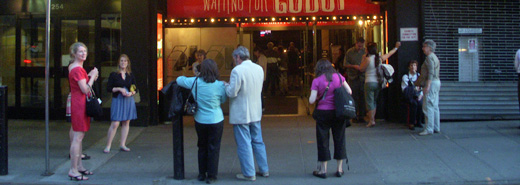Gotham Diary:
Roses
19 March 2012
Monday, March 19th, 2012
A piece of music that I have known well for most of my life (as who hasn’t, I’m inclined to ask), Wagner’s Siegfried Idyll, was transformed for me on Saturday afternoon by Paul Taylor’s choreography for Roses, a ballet that we hadn’t seen before. This is Taylor at his most pastoral and elegaic. I’m embarrassed to say that I see the dancers, in retrospect, at rest, not in motion, but I also remember that there was nothing at all static about it. I was peaceably engulfed, at one moment, by the notion that Roses embodies everything that is precious to me about life, and that therefore it would make a fitting memorial, if one were wanted. Talk about pastoral! Now that I think of it, though, Roses does convey something of the tender loss that abides in all the great Poussin canvases.
The other dances on the program were Gossamer Gallants, and Promethean Fire. Gossamer Gallants, a crowd-pleaser but pleasant withal, is the sort of thing that makes serious dance fans frown down their lorgnettes at Paul Taylor. I didn’t much care for the insect headdresses that the boys wore (it made them look like early airplane pilots or, alternatively, peasants in Breughel), nor for the wings worn by everyone, but I enjoyed the swarming animal enthusiasm of the piece. What we have here, to the tune of chestnuts from The Bartered Bride, is the birds and bees minus the birds. The girls shimmy their hips, play with their springy antennae, and form a lovely desultory kick line at the end. The boys begin hungry and eager, but end up cowed and defeated. You’re reminded of the insect species of which the males do not survive the reproductive process. Perpend. Promethean Fire is a grand ballet, despite its grandiose name, which hitherto had induced me to buy tickets for programs on which it didn’t appear. It’s so good, in fact, that I swallowed my severe distaste for Leopold Stokowski’s ponderous Bachestrations, to which Taylor responds with an expert essay in structure and decomposition. There’s an extremely intriguing moment, repeated twice I think, in which the dancers each appear to be emerging from a stationary mob, but of course no one is stationary.
The Paul Taylor Dance Company is an ensemble of individuals; there is no distinction between principals and corps. It doesn’t take long to recognize the dancers, and by the third season they’re as familiar as friends. This makes writing about them difficult. You can say all the obvious things about Michael Trusnovec or Laura Halzack or Kathleen’s new favorite, Parisa Khobdeh, but quite aside from the fact that such remarks aren’t going to mean a thing to readers who haven’t seen these virtuosos dance, they don’t capture what you want to say, which is really rather foolish and personal. There is a rigor about Paul Taylor that reminds us that the dancers, whatever their private lives, exist for us on stage only; ideally, no one would know anything about them when they weren’t in costume. Anyone who has looked into Taylor’s autobiography, Private Domain, will know what I’m talking about. On the whole, his dances are so compelling that the mind does not too often wander into irrelevancies.
***
I’m very unhappy about the Dharun Ravi conviction, and I hope that it will be overturned on appeal. It’s what lawyers call a bad case, which was already evident in Ravi’s counsel’s rejection of the plea bargain. Extremely conservative when it comes to the making of laws — there can’t be too few, in my book — I have no time for the singling out of “hate” crimes, which, as here, seem to distort a proper view of causation. Call the defendant what you like, it was established to my satisfaction, by Ian Parker’s account in The New Yorker, that the role of his silly prank in Tyler Clementi’s decision to commit suicide was immaterial at best. Dharun Ravi has been punished for treating his late roommate with political incorrectness, and no one else has been punished. This seems very wrong. Rutgers University and Tyler Clementi’s parents are, to my mind, far more culpable — they were the adults in Tyler’s life, but they were useless to him. Dharun Ravi, for his part, was expected to figure out his responsibilities on his own. He may be a jerk, but I feel deeply sorry for him.



















